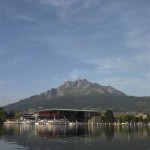In the final scenes of Mahlermania, a ‘dramatic fantasy with music by Gustav Mahler’ conceived by the troupe Nico and the Navigators in cooperation with the Deutsche Oper to inaugurate the West Berlin opera house’s new alternative stage Tischlerei on November 27, manuscript paper and fur coats scatter across the stage in front of a dismembered composing hut. An actress representing Alma Mahler, donning a fur hat and trench coat, douses herself with champagne. In the midst of a chamber performance of Abschied from Das Lied von der Erde, a figure representing the alter-ego of the composer lets out a blood-curdling howl. “Es gab Mozart, Schubert,” blurts out Alma. “Damit muss man sich abfinden” (‚There was Mozart, Schubert. One was to resign oneself to it.’). The Viennese seductress is reduced to a superficial socialite when a dancer, also Alma, waves at the audience Miss America-style.
Few historical relationships lend themselves better to a theatrical realization than the tumultuous marriage of the Mahlers, ridden by the composer’s illness, his impotence alongside the ambitious Alma, and her affair with the architect Walter Gropius, not to mention the death of their first child. Mahlermania assembles a program of chamber arrangements by Anne Champert, Rainer Riehn, and Arnold Schönberg ranging from the celestial third movement of the Fourth Symphony to songs from the Knaben Wunderhorn and Rückert Lieder cycles, which are narrated with an experimental mix of dance and theater. At the center of the action is a speed-talking Alma (Annedore Kleist) whose insatiable materialism cannot be harnessed.
Gustav’s infamous sense of being “three times homeless” as a Bohemian among Austrians, an Austrian among Germans, and a Jew throughout the world is represented with suitcases, pacing, close-ups of actors in awe-struck expressions, and the lowly shack—alongside a nearly obsessive amount of furs. At one point, Kleist reveals the history of each directly to the audience, in English—“I posed in this one for Kokoschka, totally nude…1910, New York.” More effective than such indulgent sarcasm are gestures that allow the music to breathe, such as a video projection of rolling waves onto the gauze sphere surrounding the members of the Deutsche Oper orchestra during the third movement of the First Symphony.
Mezzo soprano Katarina Bradic and baritone Simon Pauly bring sensitive musicianship to Mahler’s songs and blend well dramatically, but their performances are often intercepted by failed attempts to add psychological depth, such as the dancer Anna-Luise Recke’s ravenous munching of an apple during Bradic’s earthy tones in the devastating “Ich bin der Welt abhanden gekommen” (‘I am lost to the world’) of the Rückert Lieder. A few dance episodes gain more traction, such as when the athletic Frank Willens psychoanalyzes the lithe, Sasha Waltz-inspired moves of Recke as ego-driven before scaling the bare walls of the hut, but the Freudian twist become hackneyed as Willens takes on a purely theatrical role, diagnosing Alma as he puffs on a cigarette.
Nico and the Navigators cannot be criticized for allowing tastelessness to overrun their concept, sparing the audience the nudity and fake blood that have become signatures in German theater, but the high point lies in the musical gems brought together for the occasion. Moritz Gnann and his 16-head ensemble capably evoked the composer’s brushes with death and sighs at the world’s beauty with gleaming tone in the woodwinds, even if the string section led by Detlev Grevesmühl could have benefitted from more flexible lyricism. The new Tischlerei, a generous concrete space with raked seating designed by German architect Stefan Braunfels, provided intimate acoustics.
The new stage for experimental Musiktheater, having secured support from the Berlin Senate, the pharmaceutical company Aventis, and other private sponsors, has the potential to incubate exciting collaborations in a city where the alternative scene is just starting to win the attention and funding for which it has long been fighting. In a post-performance celebration over pro secco and pretzels, young creatives mingled with the bourgeois core audience of the Deutsche Oper as well as the new Intendant Dietmar Schwarz and the city’s Culture Secretary André Schmitz. The German capital is fortunate to be booming while recession beleaguers many parts of Europe. Yet if Mahlermania stands an example of what is to come at the Tischlerei, it is the dramaturgy that will provide the biggest challenge.

